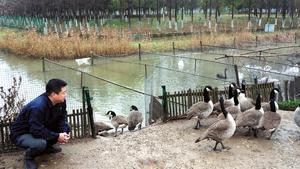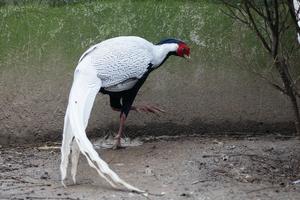A Shanghai native becomes a breeder of exotic birds on an island in the city, Xing Yi reports in Shanghai.
 Yang Ji, founder of Wanyang Zhenqin, a breeding center for rare birds in Qianwei village on Chongming Island, Shanghai, raises around 1,500 avians, many of which are rare or endangered species. (GAO ERQIANG / CHINA DAILY)
Yang Ji, founder of Wanyang Zhenqin, a breeding center for rare birds in Qianwei village on Chongming Island, Shanghai, raises around 1,500 avians, many of which are rare or endangered species. (GAO ERQIANG / CHINA DAILY)
Yang Ji might not have any children, but he already has his hands full with "parental" duties.
As the founder of Wanyang Zhenqin, a breeding center for rare birds in Qianwei village on Chongming Island, the 39-year-old raises around 1,500 avians, many of which are rare species that were imported from abroad, as well as endangered ones like the hornbill, the Chinese pheasant and the Canadian cape barren goose.
These are all native species in China and I’ve succeeded in breeding and raising their babies
Yang Ji, founder of Wanyang Zhenqin breeding center for rare birds
According to Yang, the center has three species of birds on the national first-tier protected-animal list, and around 20 species are on the second-tier list.
Born in Shanghai in 1981, Yang studied accounting in college before becoming a civil servant, fulfilling his parents' wishes of him securing a stable job. But he only lasted a year in that role-he was bored and simply wanted to follow his dream of working with animals.
"I've loved animals since I was a child. I raised many animals, such as goldfish, turtles and pigeons during my school years," he says.
"Raising animals was my hobby and my dream. Now, it is a dream come true."
Yang made a career switch in 2006 and started working at a chicken farm to learn the ropes about breeding birds before he opened his first breeding center in Pudong a few years later.
 Yang Ji, founder of Wanyang Zhenqin, a breeding center for rare birds in Qianwei village on Chongming Island, Shanghai, raises around 1,500 avians, many of which are rare or endangered species. (GAO ERQIANG / CHINA DAILY)
Yang Ji, founder of Wanyang Zhenqin, a breeding center for rare birds in Qianwei village on Chongming Island, Shanghai, raises around 1,500 avians, many of which are rare or endangered species. (GAO ERQIANG / CHINA DAILY)
"The first five years, from 2006 to 2011, were very difficult for me because I had to learn things from scratch. I made many mistakes along the way, but I also learned a lot," he says. "For example, there are huge differences between raising a chicken and a swan."
He shared that the first batch of swans he bought eventually became crippled, and some even died, even though he went to great lengths to feed them good food and ensure that their pens were warm. But after consulting with experienced ornithologists, he learned that the animals simply needed to eat grass. In addition, the swans should not have been cooped up in their pens but let out to exercise in the cold water.
He then went to learn more about the trade with seasoned bird keepers and experts from zoos, working alongside them for days and observing how they raised the animals.
"The fodder for myna needs to be mixed with cooked soybeans, the hornbills love to eat strawberries, and the small fish that are fed to penguin chicks must be smashed and put in the fridge for three days so that it looks like what their parents would feed them," says Yang, when recalling of the tricks of the trade he picked up.
In 2011, Yang bought a small, deserted zoo in Chongming and renovated it before setting up his rare-bird breeding center.
"Chongming is an ideal place for my business," he says, explaining that the island has a national-level nature reserve for birds and is aiming to become a world-class ecological island by 2035.
 Yang Ji, founder of Wanyang Zhenqin, a breeding center for rare birds in Qianwei village on Chongming Island, Shanghai, raises around 1,500 avians, many of which are rare or endangered species. (GAO ERQIANG / CHINA DAILY)
Yang Ji, founder of Wanyang Zhenqin, a breeding center for rare birds in Qianwei village on Chongming Island, Shanghai, raises around 1,500 avians, many of which are rare or endangered species. (GAO ERQIANG / CHINA DAILY)
In 2014, Yang received his license to breed first-tier protected animals from the National Forestry and Grassland Administration, the government agency that oversees the breeding and trading of wild animals in China. He has since introduced several endangered pheasants to his center, including the golden pheasant, Elliot's pheasant and the Taiwan blue pheasant.
"These are all native species in China and I've succeeded in breeding and raising their babies," he says.
"There are slight habitat differences between each species. They require a great deal of attention, and pheasants are very timid. So, breeders need to establish trust with them slowly."
Yang also needs to ensure the safety of his birds by checking their health monthly and injecting them with vaccines annually.
His breeding center, which supplies birds to zoos around China, isn't all about profit. Yang says that he is planning to release some endangered birds to help grow the population in the wild.
Yang, who has a home in downtown Shanghai, has no qualms living in his center on weekdays-and it is not because he's too lazy to make the long commute home.
"I am passionate with my work and never feel exhausted," he says.
"Living with the birds and seeing them every day makes me a happy man."
Contact the writer at xingyi@chinadaily.com.cn


